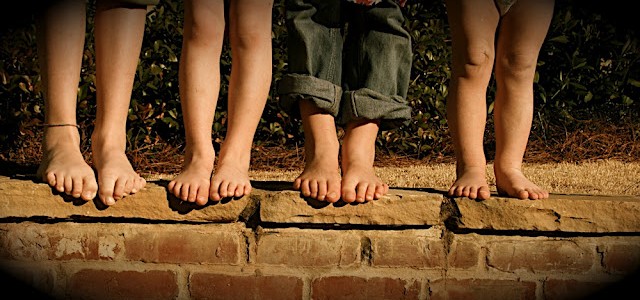Warning: this post is about an open discussion between me and my tween/teen daughters concerning rape. I have attempted to be sensitive, but the nature of the post is fraught with potential triggers.
As my children donned costumes of zombies and vikings, they gathered with friends to dart through the streets filling plastic pumpkins and pillowcases with fun-sized treats from the neighborhood adults. So far in my life, the only thing scary about Halloween has been having that amount of chocolate so easily accessible to me the day they go back to school.
This Halloween started out the same. My girls in 6th and 8th grades wanted to go out with their friends, and our little town has such a safe and hometown-neighborhoody feel I had no reason to be concerned.
Days after the big holiday, I heard that there had been a rape of a 14 year old girl that night at the poorly-lit field of one of the local elementary schools, just streets away from where my own girls ran carefree that night. There were reports of a bunch of kids drinking and what started as partying among friends turned to the unspeakable. This gut-wrenching news was difficult to hear and even harder to talk about with 11 and 13 year olds. While I’ve been very open about sex, I’ve been more guarded about violence, and this conversation was far different from the good touch/bad touch scenarios we’d discussed before.
“Unspeakable” is an interesting way for me to label this crime, especially considering statistics show an American is sexually assaulted every 2.5 minutes. Yet as much as I teach my children not to take candy from strangers or to stay away from suspicious white vans without windows, this is a subject about which I haven’t spoken to them. Maybe by making it more “speakable” we will have to deal with it and the culture we have created as a society that seems to tolerate it on some level.
I didn’t have a chance to plan the conversation before one of my daughters brought it up. I tried to mostly listen, but knowing this was likely a topic of conversation with their friends and wanting them to have some adult perspective, I found myself asking pretty probing questions and trying to steer their ideas. Having this crime hit so close to home made talking about it dark and eerily personalized – this was someone’s daughter, sister, friend; and my underlying fear of assault quickly moved from concern for my own well-being to the reality of the possibility of this happening to my own daughters.
Self-protection swung into high gear as I heard my daughter wonder if this was avoidable. It was classic victim-blaming, and I wanted to go there myself, instinctively categorizing the attack in an attempt to soothe ourselves with the reassurance that this couldn’t happen to us. I wanted desperately to believe that if I could just tell my daughters that if they never got drunk, never wore a short skirt, never went anywhere alone or after dark or learned some self-defense, they would never be a victim. But I know this is false. And my more reasonable self is angry that I live in a society that doesn’t spend equal time telling my sons how to avoid being victim or perpetrator.
As the conversation turned to talk about situational nuances beyond this incident, my girls wondered whether you could be raped if you would have had sex with the person anyway. The tiny hairs on my neck stood at attention as I realized with sadness I had left a void of information before, and society had filled it with misnomers, myths I’m trying to reshape.
They’re not as young as I once believed and neither as naïve.
Is this issue “speakable” between you and your children?

I just finished “Reviving Ophelia” by Mary Pipher. I recommend it.
She writes about the challenges all girls face, but particularly those who are 10-14. Some of what she writes about is fear based, but some of it is simply realistic. As parents, it is hard to try to support one’s daughter through this time. And the influence of culture is pervasive. Even very protective LDS parents are not immune from navigating these waters.
I applaud you for having an open conversation with your daughters. They will know there are different opinions and ways to react. Finally, I hope that the daughter of a friend is getting professional help. I believe it can make a huge difference. If the statistics are true, one out of four women will be raped in their lifetime. But that also means that many women have survived and thrived despite this violence. I believe that story also needs to be told; it happens, it’s not your fault and you can move forward with time.
Very well said.
“It was classic victim-blaming, and I wanted to go there myself, instinctively categorizing the attack in an attempt to soothe ourselves with the reassurance that this couldn’t happen to us. ”
Very insightful- thanks.